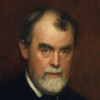“ a man should have any number of little aims about which he should be conscious and for which he should have names, but he should have neither name for, nor consciousness concerning the main aim of his life. ”
Samuel Butler, The Note-Books of Samuel Butler (1912). copy citation
| Author | Samuel Butler |
|---|---|
| Source | The Note-Books of Samuel Butler |
| Topic | consciousness life |
| Date | 1912 |
| Language | English |
| Reference | |
| Note | |
| Weblink | http://www.gutenberg.org/files/6173/6173-h/6173-h.htm |
Context
“Matthew Arnold on yet another point. I understand him to imply that righteousness should be a man’s highest aim in life. I do not like setting up righteousness, nor yet anything else, as the highest aim in life; a man should have any number of little aims about which he should be conscious and for which he should have names, but he should have neither name for, nor consciousness concerning the main aim of his life. Whatever we do we must try and do it rightly—this is obvious—but righteousness implies something much more than this: it conveys to our minds not only the desire to get whatever we have taken in hand as nearly right as possible, but also the general reference of our lives to the supposed will of an unseen but supreme power.”
source


